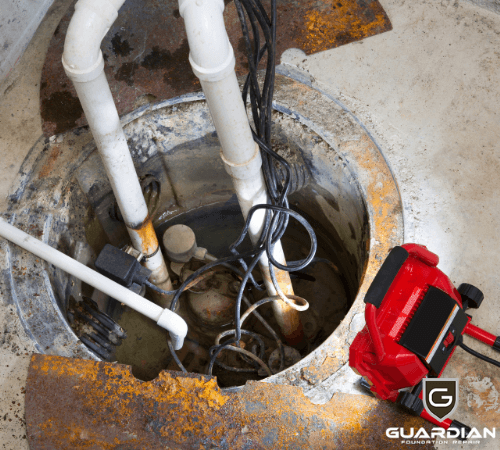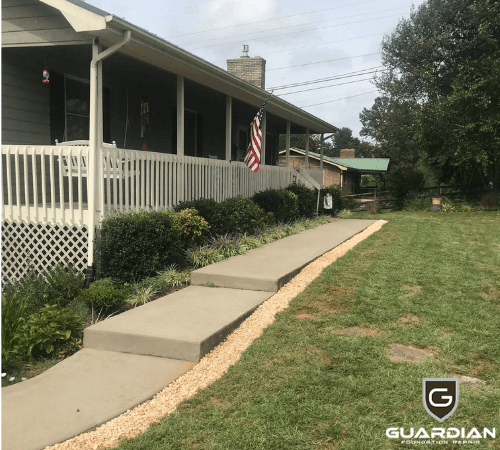Introduction:
A wet basement can be a severe problem for homeowners living in Tennessee. The moisture from a damp basement can lead to :
- Mold and mildew can cause health problems.
- Attract termites and other insects, which can destroy the wood in your home.
- Damage the structural integrity of your home foundation, which can lead to expensive repairs.
To safeguard your basement from flooding, along with a solid basement waterproofing solution, you also need to install an effective home drainage system. Two of the most popular options are sump pump and French drain installation. But which one is better for your basement?
While both draining options effectively keep your basement dry, there are some critical differences. These fundamental differences are essential to consider when choosing a drainage system for your home. In order to make an informed decision, you must understand the key differences between the two.
In this article, Guardian Foundation Repair will provide you with a comprehensive overview of sump pumps and French drains and if one is better than the other for your basement.
What is a Sump Pump?
A sump pump is a small, submersible pump installed in the lowest point of your basement to prevent flooding. Most of the time, the pump will be on standby; however, when it starts to rain or there is a large amount of snowmelt, the ground around your home will become saturated with water. This is where the sump pump comes into play.
Once the ground becomes oversaturated, the water will fill up the sump pit. As the water level in the pit rises, it will trigger the float switch on the pump. Once activated, the pump will turn on and pump the water out of the pit and away from your home through a discharge pipe, preventing your basement from flooding.
Read here to know when is the time to replace your sump pump.
What is a French Drain?
A French drain is a drainage system that consists of a ditch with a perforated pipe in the center, surrounded by gravel. The system was invented to stop water pooling and keep excess water out.
It is more of a passive drainage system as it does not require electricity to operate. And once installed should last for many years regardless of the climatic conditions outside.
Now that you have a basic understanding of each system let’s take a look at the key differences between the two.
Sump Pump Advantages over French Drain:
Pumps Large Volumes of Water:
The most significant advantage that a sump pump has over a French drain is the amount of water it can pump and the speed it can pump it. A sump pump can move a large volume of water quickly, making it ideal for homes with a flooded basement in rainy or snowy climates. On the other hand, French drains are suitable for smaller amounts of water and take longer to drain, making it challenging to keep up with a sudden downpour.
Activates Automatically:
Another advantage of a sump pump is that it will automatically turn on once the water level in the pit rises to a certain point. This is an excellent feature as it means you don’t have to constantly check the water level in your basement and worry about flooding.
On the other hand, a French drain is a passive drainage system, which means there is nothing to turn on or activate in case of a heavy downpour. Instead, the water will flow through the system at a slower rate.
Pumping Uphill:
The third primary benefit of sump pumps is to pump water uphill. It is because the pump is submersible and can be placed in the lowest point of your basement.
French drains work well when gravity is in their favor and water flows downhill. But basements that are lower than the surrounding ground level will have difficulty using a French drain as the water will pool around the basement.
Installation:
A sump pump installation is relatively easy and can be done in a few hours by a professional. However, French drains require more work as you have to dig a trench around the perimeter of your basement. It can take a couple of days to complete and is often messy and disruptive.
Sump Pump Disadvantages over French Drain
Route Water Away From Your Home:
A well-designed French drain system can route water away from your home before it ever has a chance to enter. By positioning a series of drains that empty into the city drainage or an ideal location, you can keep your basement bone dry and avoid expensive foundation repairs in Tennessee caused due to water.
Sump pumps are only designed to remove water that has already entered your home and cannot prevent water from entering in the first place.
However, house foundation repair experts in Tennessee recommend homeowners to have both systems installed because you never know when you may need the extra protection.
No Electrical Power Needed:
French drains are powered by gravity, so as long as the ground around your home is appropriately sloped and the gutters are unclogged, the water will flow away without any assistance. On the other hand, Sump pumps require electricity to operate and will not work during a power outage.
No Mechanical Parts That Can Fail:
As sump pumps rely on mechanical parts to operate, there is always the chance something can go wrong. For example, the float switch could get stuck, the pump could overheat or break, and the discharge pipe could become disconnected. If any of these things happen during a heavy rainstorm, your basement could flood. French drains have no moving parts making them less likely to fail.
Noise:
Sump pumps can be pretty loud as they are constantly running. This can be disruptive if your basement is located close to a bedroom or living room; the chances are that you won’t get a good night’s sleep with the constant noise.
French drains are silent as they only operate when water is present, making them ideal for sensitive sleepers. Also, a well-designed set of French drains will require a less powerful pump since less water will be entering the basement, thereby helping to keep noise to a minimum.
Which One is Better for Basement?
Each drainage option has its advantages and disadvantages, so the best choice for your basement will depend on several factors.
Sump pumps tend to do better when you need high pumping capacity or if your basement is lower than the surrounding ground level. Although they come with higher upfront costs, they are less disruptive to install and require little to no maintenance.
French drains are an excellent option for homeowners with large areas of land, less access to power, or those who want a more permanent solution.
Call the Expert:
If you are still unsure about which drainage system is best for your basement, the best thing to do is call a professional.
Guardian Foundation Repair has a team of experts that can assess your basement and recommend the best course of action. We have years of experience dealing with drainage issues and can help you find a perfect basement waterproofing solution in Tennessee that fits your needs.
Give us a call today to get started.


